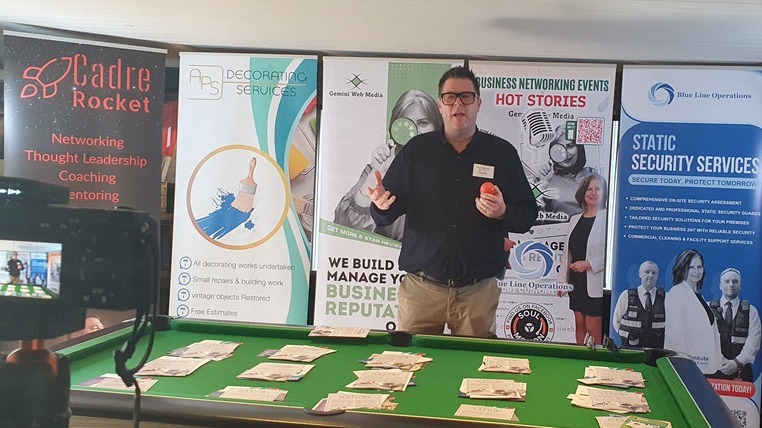At Hot Stories Cambridge, speaker Ricke Williams invited us to rethink something we all do every day without much thought - purchasing. From the moment we buy a shirt, a sandwich, or even a car, we are unknowingly entering into what he calls a carbon contract.
It’s a powerful concept that forces us to confront the reality that the carbon emissions behind everything we consume don’t simply vanish when we tap our card or walk away from the counter. They become ours. We complete the contract.
In this article, we’ll expand on Ricke’s thought-provoking talk, exploring:
What a carbon contract is and why it matters
Why transparency in carbon auditing could change how we shop
Surprising truths about everyday choices — from tomatoes to transport
The technology and systems already capable of providing answers
Why industry resistance is the biggest barrier to change
And most importantly, how this shift in mindset can drive better habits, healthier businesses, and a more sustainable future
What is a Carbon Contract?
Ricke began his talk with a simple example: buying a shirt.
The factory didn’t know you would be the one to buy it. It was manufactured “on faith” - cotton grown, processed, dyed, shipped, and stitched with the expectation that someone, somewhere, would purchase it.
The moment you did, you weren’t just buying fabric. You were completing the carbon contract. That meant all of the Scope 1, 2, and 3 emissions (from production, transportation, and supply chain) now became part of your carbon footprint.
This flips our usual thinking. Too often we see emissions as something distant, something the producer or government should worry about. But in reality, the consumer is the final link in the chain - the one who validates and finalises the entire carbon cost by buying.
Why Transparency Matters
The next step in Ricke’s argument was about knowledge.
He pointed out that when buying a sandwich, he knows from research that a beef sandwich is around 50 times worse for the environment than a chicken sandwich.
But what about bigger, more complicated purchases? For example:
Is keeping a 255,000-mile BMW running better for the planet than replacing it with a brand-new electric car?
Does the embedded carbon in manufacturing a new EV outweigh the emissions of keeping an older petrol car on the road?
If I buy two tomatoes - one grown in the UK, the other imported from Portugal - which one has the smaller footprint?
The frustrating truth? We don’t know. And the reason we don’t know is not because it’s impossible to measure, but because the systems to make that information public are not being implemented.
The Case of the Tomato
Ricke’s example of the two tomatoes captured the audience.

At first glance, it feels obvious: surely a UK-grown tomato is lower in carbon than one flown in from Portugal? After all, it travelled a shorter distance.
But here’s the twist: in many cases, the Portuguese tomato actually has a smaller carbon footprint. Why? Because it grows under natural sunlight, while in the UK many tomatoes are produced in heated greenhouses that burn significant amounts of energy.
Without clear carbon labelling, the average consumer assumes “local” equals “low-carbon” — when that’s not always true.
This is where live carbon auditing could transform decision-making.
The Vision for Live Carbon Auditing
Imagine walking into a supermarket and seeing red, amber, and green labels - not just for fat, salt, and sugar, but for carbon impact.
Green = low carbon
Amber = moderate carbon
Red = high carbon
Just as nutritional information allows us to make informed health choices, carbon labels would allow us to make informed environmental choices.
And the technology to make this happen already exists. We can trace supply chains, measure transportation methods, calculate energy use, and even compare the carbon cost of different agricultural practices.
So why doesn’t it exist in practice?
The Industry Barrier
The problem isn’t technological - it’s political and economic will.
Producers, suppliers, and retailers often fear that too much transparency will disrupt consumer behaviour, potentially hurting sales. If we knew the true carbon cost of our food, clothing, and gadgets, many of us might choose differently.
But without that transparency, we are left making decisions in the dark. As Ricke put it, “It doesn’t exist because there’s not the desire to deliver it from those who are capable.”
This lack of willpower isn’t just a business issue - it’s a cultural one. Until consumers demand this information loudly and consistently, many industries will have no incentive to change.
The Car Conundrum
Few examples highlight the complexity of carbon contracts better than the car debate.
Many people assume that buying an electric vehicle automatically makes them more environmentally responsible. But as Ricke pointed out, it’s not that simple.
Your old car - let’s say a petrol BMW with hundreds of thousands of miles - has already had its carbon debt paid during manufacturing. Every mile you drive now only adds marginal emissions from fuel.
Replacing it with a new EV might lower your operational emissions, but the manufacturing emissions of producing that new car must also be considered. Depending on how the car is made, where the batteries come from, and how electricity is generated in your country, it could take years before the EV “breaks even” on its carbon footprint.
Once again, without clear carbon auditing, the consumer is left guessing.
Why Every Purchase Matters
Ricke’s central message was clear:
👉 Every time we buy, we complete the carbon contract.
👉 Every time we choose between two products, we are casting a vote for the future.
👉 And until live carbon auditing becomes mainstream, we have to educate ourselves, ask better questions, and demand transparency.
What Businesses Can Do Today
While large-scale policy changes are slow, businesses can begin to take action now:
Measure Their Own Carbon Footprint
Tools and consultancies already exist to calculate emissions across supply chains.Communicate Transparently
Sharing even partial information - such as emissions from shipping or packaging - builds consumer trust.Offer Alternatives
Presenting lower-carbon options alongside traditional ones empowers customers to choose better.Engage Customers in the Story
As Ricke demonstrated, storytelling makes complex topics like carbon contracts understandable and memorable.
Why This Matters for Everyone
At the end of the talk, Ricke returned to the tomatoes.
He reminded us that choice without information is no choice at all. If we don’t know whether a tomato from Portugal is better or worse than one from the UK, we are left relying on guesswork and assumptions.
With live carbon auditing, the invisible could become visible. Consumers could reward businesses that take sustainability seriously. And most importantly, individuals could take meaningful responsibility for their carbon contracts.
Because at the end of the day, this isn’t just about emissions. It’s about habits, culture, and accountability.
The Hot Stories Connection
Talks like Ricke’s are exactly why the Hot Stories business networking series exists. It’s not about pitches or hard sells. It’s about real conversations that make us think differently - about our businesses, our communities, and our impact on the world.
📍 This talk was recorded live at the Hot Stories Networking event in Cambridge.
🗓️ Held every second Wednesday of the month
📍 Location Partner: The Red Lion, Cherry Hinton, Cambridge
📸 Filmed by Oksana Hrytsaienko – LinkedIn Profile
🔵 Sponsored by Blue Line Operations Ltd – bluelineoperations.co.uk
💼 Organised by Gemini Web Media – geminiweb.media
✨ Upcoming Hot Stories Events:
Cambridge → Business Networking at The Red Lion
Connect Online → Collective Advantage Network
Membership → Gemini Web Media Membership Plans
Final Thoughts
Ricke Williams’ message is simple but profound: every purchase is a carbon contract. Whether it’s a shirt, a sandwich, a tomato, or a car, we are responsible for the emissions locked into the products we choose.
Until the day comes when live carbon auditing is as common as nutrition labels, we can start by asking better questions, pushing for transparency, and remembering that every decision matters.
 Add Row
Add Row  Add
Add 



